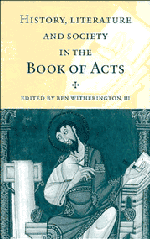Book contents
- Frontmatter
- Contents
- Preface
- PART I ISSUES OF GENRE AND HISTORICAL METHOD
- 1 In the shadow of Thucydides
- 2 How history should be written
- 3 The Acts of the Apostles: monograph or bios?
- 4 The preface to Acts and the historians
- 5 The future of the past: Luke's vision of salvation history and its bearing on his writing of history
- PART II HISTORICAL AND THEOLOGICAL DIFFICULTIES IN ACTS
- PART III ISSUES OF LITERARY CRITICISM
- Index of biblical references
2 - How history should be written
Published online by Cambridge University Press: 02 February 2010
- Frontmatter
- Contents
- Preface
- PART I ISSUES OF GENRE AND HISTORICAL METHOD
- 1 In the shadow of Thucydides
- 2 How history should be written
- 3 The Acts of the Apostles: monograph or bios?
- 4 The preface to Acts and the historians
- 5 The future of the past: Luke's vision of salvation history and its bearing on his writing of history
- PART II HISTORICAL AND THEOLOGICAL DIFFICULTIES IN ACTS
- PART III ISSUES OF LITERARY CRITICISM
- Index of biblical references
Summary
Of those who in the nineteenth century applied the historical method to the study of the New Testament and the early church none were more important than Ferdinand Christian Baur and Joseph Barber Lightfoot. My intention in this chapter is to compare them and the outstanding contributions they made to our knowledge of the period with which they dealt. I do this in the hope of recalling for our profit some of the history of New Testament study and of making the point that New Testament study is, or ought to be, a field for international cooperation rather than international rivalry. At first I hoped that my method, of considering what each of these great men made of a particularly obscure piece of New Testament history, might lead not only to deeper understanding of how historians work but also to a fresh consideration and evaluation of the piece in question; it has proved impossible to go so far within the space available. My underlying concern is, however, with the problem of early Christian history. My title I borrow from the Latin version of a tract by Lucian, Π¸ δµσíρίαν σÅγγρøµιν. Lucian will, to my regret, occupy a smaller part of the chapter than I originally intended, but having borrowed the title I cannot omit him altogether.
I am interested in Lucian for two reasons. The first is that he really did know something about the writing of history. It has been maintained that a historical revolution took place in or about the eighteenth century; that only at that time did critical history come into being.
- Type
- Chapter
- Information
- History, Literature, and Society in the Book of Acts , pp. 33 - 57Publisher: Cambridge University PressPrint publication year: 1996
- 4
- Cited by



